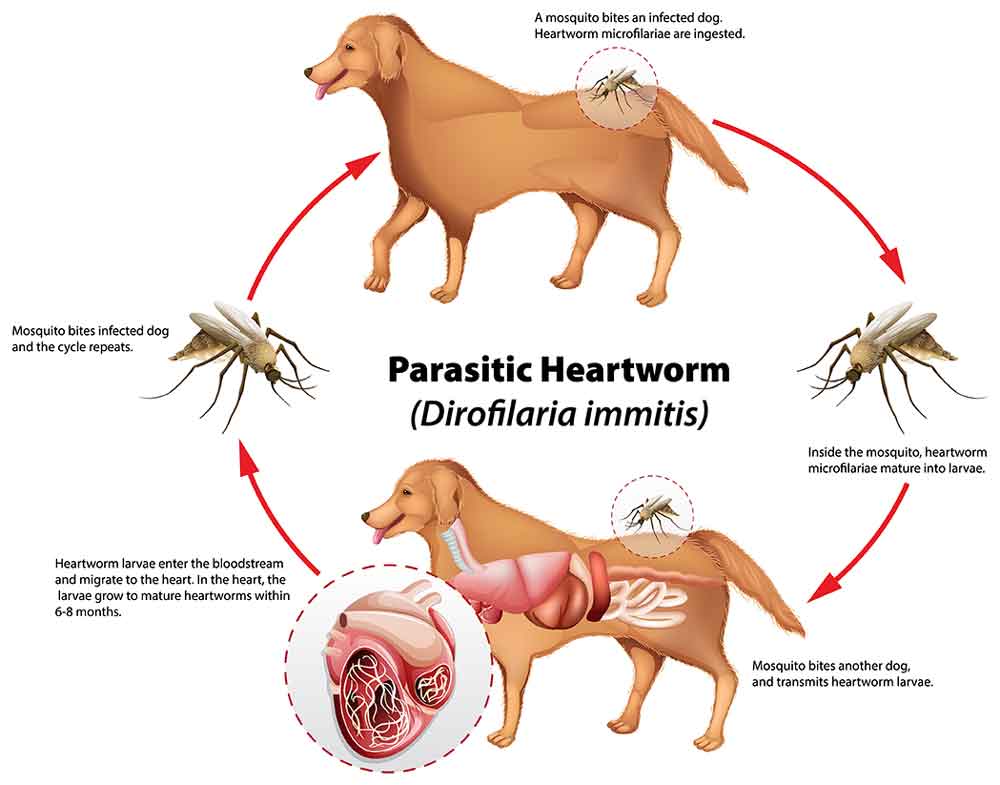How to Prevent and Treat Heartworm in Pets

It’s something all pet owners hear about, but rarely have more details on: heartworm.
Heartworm is more common than pet owners realize, and can seriously affect the health and well-being of your pet.
However scary heartworm may seem, there are plenty of prevention methods and treatment options for your pet that makes it a lot less intimidating.
What are heartworms?
Before even getting into the prevention and treatment of heartworm, it’s important to know what heartworm is.
Heartworms are blood-borne parasites, scientifically known as Dirofilaria immitis. Heartworms, as their name suggests, look like worms and usually are found within the circulatory system (including the heart and surrounding vessels).
Heartworms reproduce quickly and live for up to five years. Dogs may have as many as 300 worms present when they’re diagnosed.
How does my pet get heartworm?
Heartworm is transmitted through an intermediate host, usually a mosquito.
The mosquito will bite an infected dog and ingests the larvae of the heartworm. When it bites another dog, the larvae can transfer from the mosquito to the dog.
Heartworm can be found in all regions of the United States. It’s especially common in areas where mosquitoes are prevalent, like coastlines and river shorelines.
A common misconception is that heartworm can be transferred from dog to dog. This is untrue: heartworm needs that intermediate host, the mosquito, to transmit the disease. So, one dog cannot spread heartworm to another dog.

What can I do to prevent heartworm?
There are lots of ways to prevent heartworm. The most common way to prevent heartworm is through chewables: popular brands include Heartgard, Interceptor, and NexGard.
Your vet will be able to provide you with medications that can prevent heartworm.

What does heartworm do to dogs?
If left untreated, adult heartworms will clog the heart and other major blood vessels. This will interfere with your dog's circulatory system. Blood flow will be severely hindered, especially to the lungs, liver, and kidneys, and can cause widespread organ failure.
Because they’re smaller, the larvae of heartworms can spread throughout the dog's body and can cause blockage in blood vessels throughout your dog.
How can I tell whether my pet has heartworm?
It takes about five to seven months for adult heartworms to form.
At the larvae level, heartworms are usually too small to detect clinically.
If heartworm reaches adulthood, symptoms in dogs include mild, persistent cough; shortness of breath; loss of stamina; weakness; and listlessness.
If the disease continues untreated after these symptoms appear, the dog may have heart failure, excess fluid resulting in a swollen belly, and sudden blood flow blockages leading to cardiovascular collapse.
How is heartworm diagnosed?
If you fear your dog has heartworm, your vet will run blood tests.
The most common test your vet will likely run is a serological test. This detects proteins in your dog's blood that are created by adult heartworms.
Another common test is called a Knott’s test. This tests for the larvae in your dog’s blood. The blood is viewed under a microscope for signs of the larvae. The higher number of larvae present in the blood sample, the more severe the heartworm.
How do I treat heartworms?
Dogs with positive heartworm tests will undergo treatment. This is usually an injectable drug that kills adult heartworms in the heart and surrounding blood vessels.
The treatment occurs in a series of injections, usually 30 days apart. However, depending on the severity of the heartworms and your dog, your vet may customize this schedule.
In addition to the treatment for heartworms directly, your vet will likely prescribe antibiotics to prevent possible infection from the heartworms.
After the treatments, rest is required for your pet. As the adult heartworms die, they are broken up and are carried along the blood vessels, where they can lodge into important organs like the liver, lungs, and kidneys. The reabsorption process takes time, so as to prevent complications your dog should be not allowed to exercise or engage in heavy activity.
This treatment is only for the adult heartworms: after the adults have been treated, your vet will have you return to complete treatment for the baby heartworms (larvae).
After all this is completed, you will need to keep your dog on a regimen of heartworm prevention medication.
Explore Popular Articles
-
Dog Name Generator
Jul 22, 2024These are the Dog Names for Which We Have Made Custom Dog ID Tags, Dog Leashes, and Dog Collars
-
National Pet Fire Safety Day 2024 - Keeping Your Pets Safe and Secure
Jul 12, 2024National Pet Fire Safety Day, celebrated annually on July 15th, is a crucial reminder of safeguardin
-
National Lost Pet Prevention Month: Keeping Your Furry Friends Safe
Jul 05, 2024July is National Lost Pet Prevention Month, a crucial time to raise awareness about the steps pet ow




